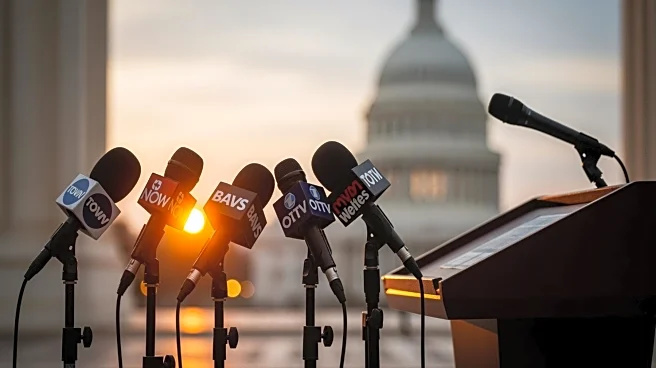What's Happening?
The Pentagon has introduced a new press policy that imposes restrictions on journalists covering military affairs. This policy has been met with significant resistance from major U.S. news networks, which have collectively decided not to sign the agreement.
As a result, dozens of journalists are expected to turn in their Pentagon press passes. The policy aims to limit the ability of journalists to report on national security issues, raising concerns about the potential impact on comprehensive coverage and journalistic freedoms. NPR's Michel Martin discussed the implications of this policy with Pete Williams, a longtime journalist and former Defense Department spokesperson.
Why It's Important?
The rejection of the Pentagon's new press policy by major news outlets underscores the ongoing challenges faced by journalists in accessing critical information. This development is significant as it highlights concerns about the decline in press freedom, both domestically and globally. The policy, if implemented, could severely restrict journalists' ability to provide comprehensive coverage of military affairs, potentially impacting public understanding and transparency regarding national security issues. The decision by news networks to reject the policy reflects a broader pushback against measures perceived to threaten core journalistic protections.
What's Next?
The foreseeable consequences of this development include potential negotiations between the Pentagon and news organizations to find a compromise that addresses the concerns raised by journalists. Major stakeholders, including political leaders and civil society groups, may weigh in on the issue, advocating for the protection of press freedoms. The situation could lead to increased scrutiny of government policies that affect media access and coverage, prompting discussions on the balance between national security and the public's right to information.
Beyond the Headlines
This situation raises deeper ethical and legal questions about the role of the press in a democratic society and the extent to which government policies can limit journalistic access. The long-term implications could include shifts in how military affairs are reported and perceived by the public, potentially affecting trust in both the media and government institutions. The rejection of the policy by news outlets may also inspire similar actions in other sectors where press freedom is under threat.















